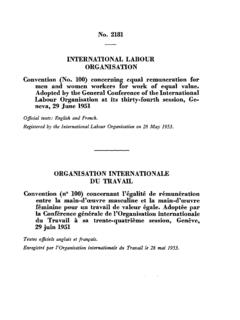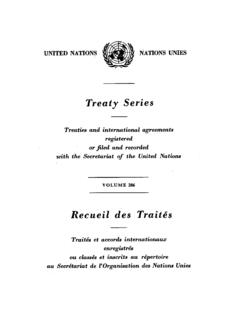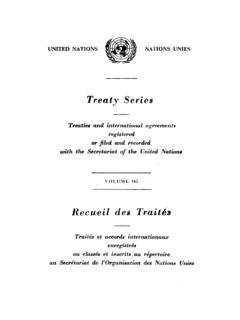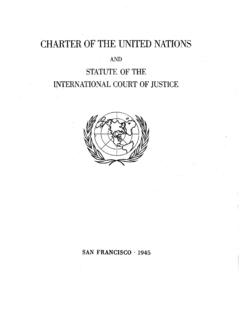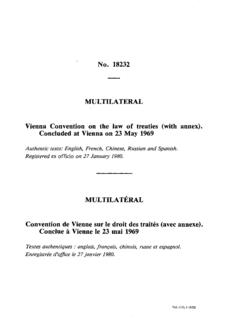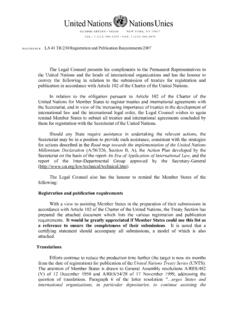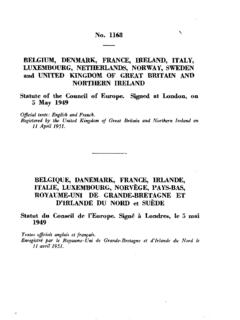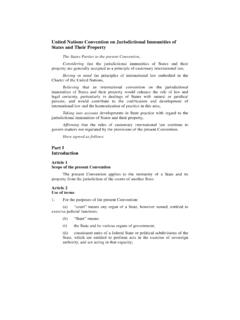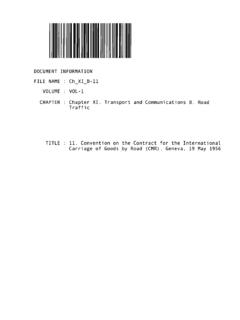Transcription of ORGANISATION INTERNATIONALE DU TRAVAIL - Treaty
1 No. 2181 INTERNATIONAL LABOUR ORGANISATIONC onvention (No. 100) concerning equal remuneration for men and women workers for work of equal value. Adopted by the General Conference of the International Labour ORGANISATION at its thirty-fourth session, Ge neva, 29 June 1951 Official texts: English and by the International Labour ORGANISATION on 28 May INTERNATIONALE DU TRAVAILC onvention (n 100) concernant l' galit de r mun ration entre la main-d' uvre masculine et la main-d' uvre f minine pour un TRAVAIL de valeur gale. Adopt e par la Conf rence g n rale de l' ORGANISATION INTERNATIONALE du TRAVAIL sa trente-quatri me session, Gen ve, 29 juin 1951 Textes officiels anglais et fran par l' ORGANISATION INTERNATIONALE du TRAVAIL le 28 mai United Nations Treaty Series 1953No. 2181. CONVENTION1 (No. 100) CONCERNING EQUAL REMUNERATION FOR MEN AND WOMEN WORKERS FOR WORK OF EQUAL VALUE. ADOPTED BY THE GENERAL CONFERENCE OF THE INTERNATIONAL LABOUR ORGANISATION AT ITS THIRTY-FOURTH SESSION, GENEVA, 29 JUNE 1951 The General Conference of the International Labour ORGANISATION , Having been convened at Geneva by the Governing Body of the Interna tional Labour Office, and having met in its Thirty-fourth Session on 6 June 1951, andHaving decided upon the adoption of certain proposals with regard to the principle of equal remuneration for men and women workers for work of equal value, which is the seventh item on the agenda of the session, andHaving determined that these proposals shall take the form of an interna tional Convention,adopts this twenty-ninth day of June of the year one thousand nine hundred and fifty-one the following Convention, which may be cited as the Equal Remu neration Convention, 1951.
2 Article 1 For the purpose of this Convention (a) the term " remuneration " includes the ordinary, basic or minimum wage or salary and any additional emoluments whatsoever payable directly or indirectly, whether in cash or in kind, by the employer to the worker and arising out of the workers' employment ;(b) the term " equal remuneration for men and women workers for work of equal value " refers to rates of remuneration established without discrimi nation based on In accordance with article 6, the Convention came into force on 23 May 1953, twelve months after the date on which the ratifications of two Members of the International Labour ORGANISATION had been registered with the Director-General of the International Labour Office. Thereafter it comes into force for any Member twelve months after the date on which its ratification has been so registered. The ratifications of the following States were registered with the Director-General of the International Labour Office on the dates indicated :Yugoslavia.
3 21 May 1952 Mexico .. 23 August 1952 Belgium* .. 23 May 1952 France .. 10 March 1953* The Convention does not apply to the territories of the Belgian Congo or United Nations Treaty Series 1953 Article 21. Each Member shall, by means appropriate to the methods in operation for determining rates of remuneration, promote and, in so far as is consistent with such methods, ensure the application to all workers of the principle of equal remuneration for men and women workers for work of equal This principle may be applied by means of (a) national laws or regulations;(b) legally established or recognised machinery for wage determination;(c) collective agreements between employers and workers; or(d) a combination of these various 31. Where such action will assist in giving effect to the provisions of this Convention, measures shall be taken to promote objective appraisal of jobs on the basis of the work to be The methods to be followed in this appraisal may be decided upon by the authorities responsible for the determination of rates of remuneration, or, where such rates are determined by collective agreements, by the parties Differential rates between workers, which correspond, without regard to sex, to differences, as determined by such objective appraisal, in the work to be performed.
4 Shall not be considered as being contrary to the principle of equal remuneration for men and women workers for work of equal 4 Each Member shall co-operate as appropriate with the employers' and workers' organisations concerned for the purpose of giving effect to the provi sions of this 5 The formal ratifications of this Convention shall be communicated to the Director-General of the International Labour Office for 61. This Convention shall be binding only upon those Members of the International Labour ORGANISATION whose ratifications have been registered with the 2181308 United Nations Treaty Series 19532. It shall come into force twelve months after the date on which the ratifications of two Members have been registered with the Thereafter, this Convention shall come into force for any Member twelve months after the date on which its ratification has been 71. Declarations communicated to the Director-General of the Interna tional Labour Office in accordance with paragraph 2 of Article 35 of the Consti tution1 of the International Labour ORGANISATION shall indicate (a) the territories in respect of which the Member concerned undertakes that the provisions of the Convention shall be applied without modification;(b) the territories in respect of which it undertakes that the provisions of the Convention shall be applied subject to modifications, together with details of the said modifications;(c) the territories in respect of which the Convention is inapplicable and in such cases the grounds on which it is inapplicable.
5 (d) the territories in respect of which it reserves its decisions pending further consideration of the The undertakings referred to in subparagraphs (a) and (b) of paragraph 1 of this Article shall be deemed to be an integral part of the ratification and shall have the force of Any Member may at any time by a subsequent declaration cancel in whole or in part any reservation made in its original declaration by virtue of subparagraphs (b), (c) or (d) of paragraph 1 of this Any Member may, at any time at which the Convention is subject to denunciation in accordance with the provisions of Article 9, communicate to the Director-General a declaration modifying in any other respect the terms of any former declaration and stating the present position in respect of such territories as it may 81. Declarations communicated to the Director-General of the Interna tional Labour Office in accordance with paragraphs 4 or 5 of Article 35 of the Constitution of the International Labour ORGANISATION shall indicate whether the provisions of the Convention will be applied in the territory concerned without modification or subject to modification; when the declaration indicates that the provisions of the Convention will be applied subject to modifications, it shall give details of the said United Nations, Treaty Series, Vol.
6 15, p. 35; Vol. 18, p. 386, and Vol. 20, p. 2181310 United Nations Treaty Series 19532. The Member, Members or international authority concerned may at any time by a subsequent declaration renounce in whole or in part the right to have recourse to any modification indicated in any former The Member, Members or international authority concerned may, at any time at which this Convention is subject to denunciation in accordance with the provisions of Article 9, communicate to the Director General a decla ration modifying in any other respect the terms of any former declaration and stating the present position in respect of the application of the 91. A Member which has ratified this Convention may denounce it after the expiration of ten years from the date on which the Convention first comes into force, by an act communicated to the Director-General of the International Labour Office for registration. Such denunciation shall not take effect until one year after the date on which it is Each Member which has ratified this Convention and which does not, within the year following the expiration of the period of ten years mentioned in the preceding paragraph, exercise the right of denunciation provided for in this Article, will be bound for another period of ten years and, thereafter, may denounce this Convention at the expiration of each period of ten years under the terms provided for in this 101.
7 The Director-General of the International Labour Office shall notify all Members of the International Labour ORGANISATION of the registration of all ratifications, declarations and denunciations communicated to him by the Mem bers of the When notifying the Members of the ORGANISATION of the registration of the second ratification communicated to him, the Director-General shall draw the attention of the Members of the ORGANISATION to the date upon which the Convention will come into 11 The Director-General of the International Labour Office shall communi cate to the Secretary-General of the United Nations for registration in accord ance with Article 102 of the Charter of the United Nations full particulars of all ratifications, declarations and acts of denunciation registered by him in accordance with the provisions of the preceding 2181312 United Nations Treaty Series 1953 Article 12At such times as it may consider necessary, the Governing Body of the International Labour Office shall present to the General Conference a report on the working of this Convention and shall examine the desirability of placing on the agenda of the Conference the question of its revision in whole or in 131.
8 Should the Conference adopt a new Convention revising this Conven tion in whole or in part, then, unless the new Convention otherwise provides (a) the ratification by a Member of the new revising Convention shall ipso jure involve the immediate denunciation of this Convention, notwithstanding the provisions of Article 9 above, if and when the new revising Convention shall have come into force;(b) as from the date when the new revising Convention comes into force this Convention shall cease to be open to ratification by the This Convention shall in any case remain in force in its actual form and content for those Members which have ratified it but have not ratified the revising 14 The English and French versions of the text of this Convention are equally foregoing is the authentic text of the Convention duly adopted by the General Conference of the International Labour ORGANISATION during its Thirty- fourth Session which was held at Geneva and declared closed the twenty-ninth day of June FAITH WHEREOF we have appended our signatures this second day of August President of the Conference : RAPPARDThe Director-General of the International Labour Office : David A.
9 MORSENo. 2181
